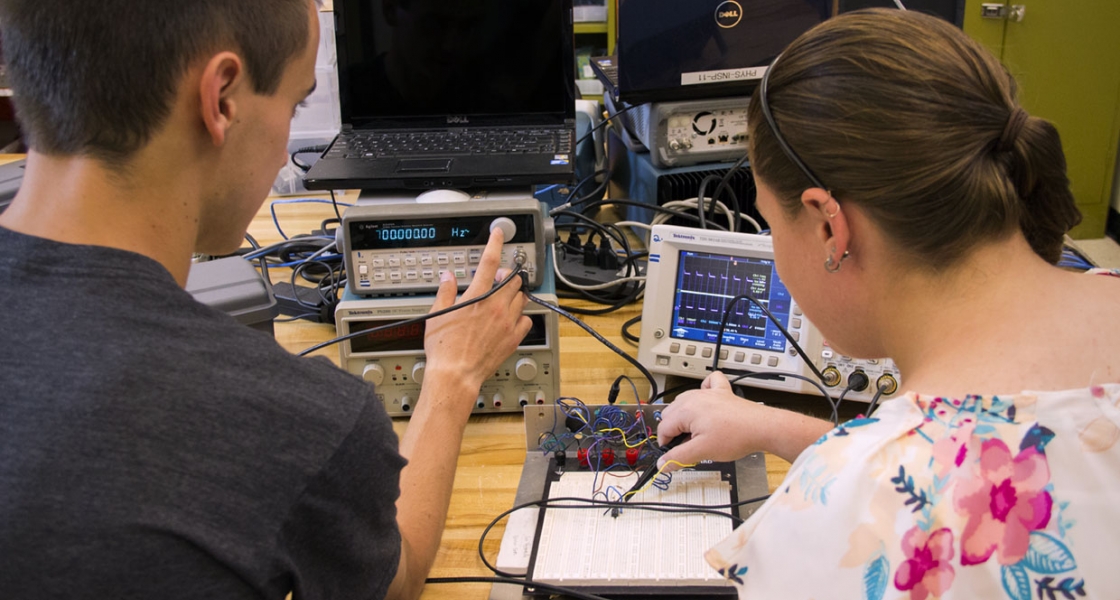Physics education researchers from the University of Colorado Boulder and the University of Maine recently showed that students troubleshooting a malfunctioning electric circuit successfully tackled the problem by using models of how the circuit ought to work. The researchers confirmed this approach by analyzing videotapes of eight pairs of students talking aloud about their efforts to diagnose and repair a malfunctioning electric circuit. The circuits had not just one, but two problems. Both problems had to be corrected for the circuit to work properly.
The researchers responsible for this work included Fellow Heather Lewandowski, MacKenzie Stetzer, Assistant Professor of Physics at the University of Maine, research associate Dimitri R. Dounas-Frazer (Colorado) and graduate student Kevin L. Van De Bogart (Maine). Their work was published in Physical Review Physics Education Research as an Editors’ Suggestion on June 15, 2016.
Lewandowski and Dounas-Frazer designed this study because troubleshooting is an integral part of being successful in both electronics and experimental physics.
“Things never work the first time,” Lewandowski observed. “Things always break. A big portion of the lives of students studying experimental physics is troubleshooting. This is a valuable skill.” Lewandowski should know. She divides her time between physics education research and experimental research on cold molecules.
The study subjects were pairs of advanced undergraduate students taking similar electronics laboratory courses at the University of Colorado Boulder and at the University of Maine. Lewandowski said she and her colleagues followed a rigorous process of coding the videotaped student conversations as the student pairs were troubleshooting the faulty circuits. In their analysis of the coded conversations, the researchers determined exactly how the students were engaged in modeling. And, they were able to demonstrate that modeling was important for troubleshooting.
“You have to have a model of your system,” Lewandowski said, “Because otherwise you don’t even know if something is wrong. If you don’t have predictions or expectations of various parts of the circuit, it’s hard to know if it’s working or not, or how to go about fixing the problem.”
This research underscores the importance of teaching students that troubleshooting is a process of experimentation. That means expecting that a new experiment isn’t necessarily going to work the first time. Often, new experiments become puzzles to solve.
“Troubleshooting is an integral skill for experimental physics, whether it’s electronics or something else that’s gone wrong in the lab, Lewandowski said. “And, a student’s ability to model systems is integral to being able to troubleshoot successfully.”–Julie Phillips



 The Physics Frontiers Centers (PFC) program supports university-based centers and institutes where the collective efforts of a larger group of individuals can enable transformational advances in the most promising research areas. The program is designed to foster major breakthroughs at the intellectual frontiers of physics by providing needed resources such as combinations of talents, skills, disciplines, and/or specialized infrastructure, not usually available to individual investigators or small groups, in an environment in which the collective efforts of the larger group can be shown to be seminal to promoting significant progress in the science and the education of students. PFCs also include creative, substantive activities aimed at enhancing education, broadening participation of traditionally underrepresented groups, and outreach to the scientific community and general public.
The Physics Frontiers Centers (PFC) program supports university-based centers and institutes where the collective efforts of a larger group of individuals can enable transformational advances in the most promising research areas. The program is designed to foster major breakthroughs at the intellectual frontiers of physics by providing needed resources such as combinations of talents, skills, disciplines, and/or specialized infrastructure, not usually available to individual investigators or small groups, in an environment in which the collective efforts of the larger group can be shown to be seminal to promoting significant progress in the science and the education of students. PFCs also include creative, substantive activities aimed at enhancing education, broadening participation of traditionally underrepresented groups, and outreach to the scientific community and general public.